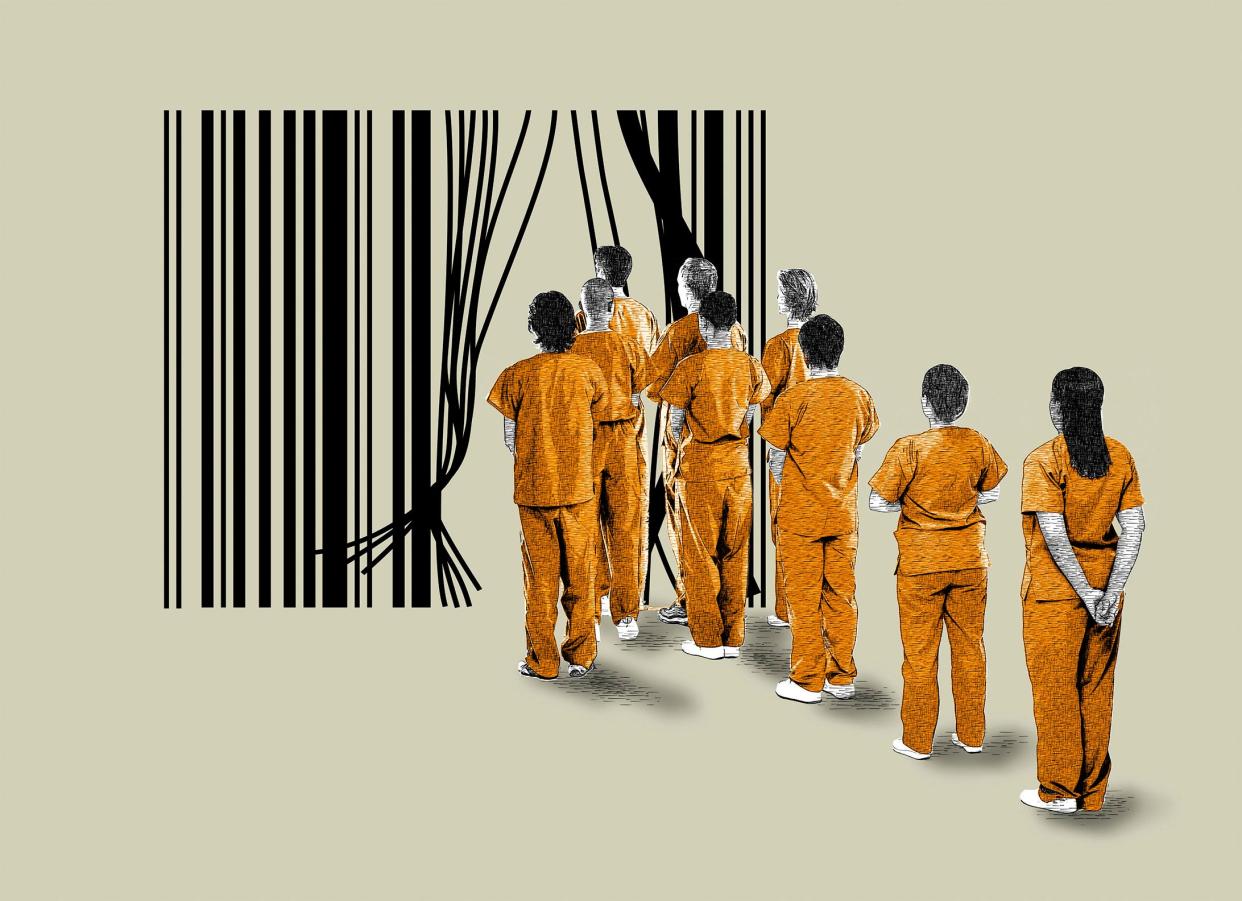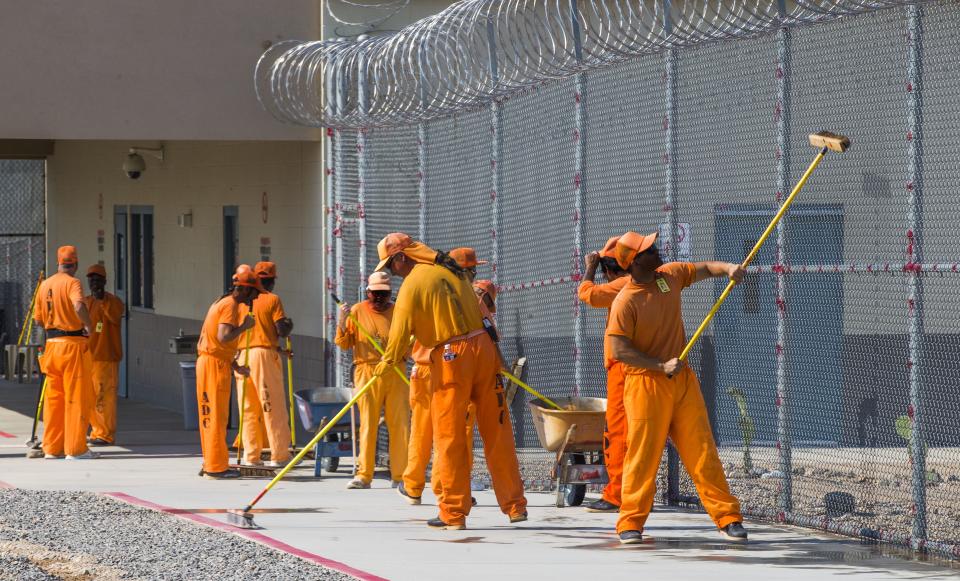Private companies found using immigrant labor, with the help of Arizona prisons

Despite an Arizona law that requires private companies to verify that their employees are legally able to work in the United States, an investigation by the Arizona Republic, part of the USA TODAY Network, found that a small handful of companies have exploited a loophole by hiring prisoners who have ICE detainers, and would otherwise be ineligible to work in the U.S.
At least 18 people who have the detainers, which means that they can be turned over to immigration officials and deported from the country, were involved in jobs including packaging salads for one of the world’s largest fresh food processors, building trusses and frames for homes for a local construction company and working for lead-generating telecommunications companies. Those jobs paid at least $4.75 an hour, far below the federal or state minimum wage or what companies would actually pay for the work on the outside.
Among the companies discovered to have used unauthorized migrant labor were Hickman’s Egg Farms, Taylor Farms, NatureSweet and Televerde.
In an emailed statement, Lori Sweet, NatureSweet’s vice president of global marketing, said the company was unaware of the department using unauthorized workers and terminated its contract with the state in 2016: “If NatureSweet knew or heard that (the Department of Corrections) used undocumented workers, it would have taken immediate steps to investigate the situation and ensure full compliance with the law.”
None of the other companies would comment on The Republic’s findings when contacted by email or phone.
The Republic found an additional eight people classified with ICE detainers who had worked directly for Arizona Correctional Industries, a for-profit business run by the Department of Corrections. ACI uses prisoners and pays them sub-minimum wages to do forced labor for companies.
Typically, those who are not legally allowed to work — those on tourist visas or who crossed the border illegally — are eligible for deportation through ICE at the beginning of their sentence. However, the state can determine if ICE will detain them later during their time incarcerated.
All the people identified by The Republic had ICE detainers placed on them after their time working at ACI, making it unclear if they still would have been deployed by the department for work at private companies.
The Department of Corrections would not respond to multiple emails asking for comment and clarity.
Previous investigation:This Arizona city is built on prison labor. That keeps taxes low. But what’s the real cost?
Using prisoners as labor is a common practice for most states that aim to curb taxpayer spending on state-produced goods. But Arizona has again proven itself an outlier in how they use and contract prison labor.
The Arizona Department of Corrections, Rehabilitation and Reentry has used at least 15,700 “Mexican nationals” as hired hands over the past 15 years. Those prisoners are people who were born in Mexico and either have legal residency here, don’t have authorization to live here or are here under a visa program.
Among those who have ICE detainers, the 26 people found to work for private companies are just a tiny sliver of the number of imprisoned unauthorized migrants who are exploited by the state as a source of cheap labor. More than 10,000 people with ICE detainers are forced to work inside Arizona’s public and privately owned correctional facilities.
The majority of the workers maintain the prisons, installing drywall, cleaning floors, or assisting in the preparation of food. They make anywhere from 15 cents an hour to upward of $1.
Since 1972, the data showed, Arizona has paid more than 16,400 people who it classifies as “Mexican nationals” to work.
“I’m venturing a guess that a large majority of the people who are labeled a Mexican national by DOC are unauthorized to work here,” said Ruben Reyes, an immigration attorney and director of the American Immigration Lawyers Association.
But trying to understand the total number of imprisoned migrants who are being exploited by the state is difficult.
The Department of Corrections doesn’t differentiate between Mexican nationals that may have lost their work authorization as a result of their felony conviction from others. At any given time, the department has more than 2,000 people in its custody who it classifies as “criminal aliens,” according to data available on the department’s webpage.
Though the use of unauthorized immigrant labor may be hypocritical, considering the state’s tough-on-immigration rhetoric and history of passing laws to make it harder for people to work here if they’re living here illegally, what the corrections department is doing is not illegal.
Had the state been “using migrant individuals who are unable to work legally here, that seems like just a violation of the law,” said Michael Selmi, a professor at ASU’s School of Law who is an expert in employment law and civil rights. “If they are migrants who are detained, then it would fall under the prison labor law in Arizona.”
Selmi said that standard labor requirements for employers and workers to prove citizenship or legal residency don’t apply to prisons and wards of the state because state law specifically says prisoners don’t have labor protections.
That law, enshrined by the legislature in the 1990s but having existed well before statehood, says that Arizona’s prisons can use incarcerated labor without payment. The territorial-era law is modeled after the federal 13th Amendment, which banned slavery except in instances of imprisonment. It also requires any person imprisoned in Arizona to work unless they get a medical waiver.
This loophole in Arizona’s prison labor law is a ripe area for lawyers eager to challenge the state’s labor practices, said Selmi. He said there should be concern that private companies, including privately owned prisons, have been able to use so many undocumented workers in Arizona without oversight from the labor department.

The findings are part of The Republic’s and KJZZ Radio’s investigative series on prison labor released earlier this year. The news organizations found that the state’s use of incarcerated labor has been a boon for the state’s for-profit arm that leases out prisoners, but has put prisoners’ health and future work ability at risk. The investigation also found that the state’s claims about its work program’s efficacy were not entirely true.
But while Arizona is not unique in this labor exploitation, a handful of states this year in the midterms — Alabama, Tennessee, Oregon and Vermont — became part of a new cohort where residents banned state corrections departments from using prisoners for work without equal pay.
“Tonight, voters in Oregon and other states have come together across party lines to say that this stain must be removed from state constitutions,” said U.S. Sen. Jeffery Merkley, a Democrat from Oregon on Election Night. “Now, it is time for all Americans to come together and say that it must be struck from the U.S. Constitution. There should be no exceptions to a ban on slavery."
In Arizona, House Democrats attempted to pass similar legislation in 2022 but failed.
All of this is against the backdrop of Arizona’s strict immigrant labor laws, which are meant to stop companies and other businesses from using migrants who are here without work authorization.
In 2007, Arizona passed the Legal Arizona Workers Act, which required employers to verify that their workers – whether they are paid in cash or by paycheck – are authenticated as legal workers using the federal E-Verify portal.
But the private employers that used Arizona’s incarcerated immigrant population did not have to go through the same steps. The Department of Corrections, not individual employers, handles the payment and hiring of prisoners for jobs at their for-profit state-run company, Arizona Correctional Industries. Those jobs are primarily offered as private-sector work.
Using this kind of prison labor at the state level is problematic for Arizona politicians, who have championed and won legislative clout by pushing for harsh penalties against companies that tried to use cheap migrant labor.
State Sen. T.J. Shope, a Republican from Coolidge, Arizona and a vocal proponent of private prison groups and the Department of Corrections, has been one of the state’s biggest critics on immigration issues. But when asked if he was aware of the state using unauthorized workers from prisons, his office did not respond.
State Rep. John Kavanaugh, another political juggernaut representing Fountain Hills, who supported expanding private prisons and harder crackdowns on immigrant labor, also would not answer questions when The Republic contacted his office.
“It’s more than hypocritical, it’s egregious,” said Caroline Isaacs, executive director for Just Communities Arizona, an abolitionist group in the state. “It just shows that the people in charge have no problem exploiting people for their own ends.
This article originally appeared on USA TODAY: Arizona prisons selling undocumented workers to private companies

